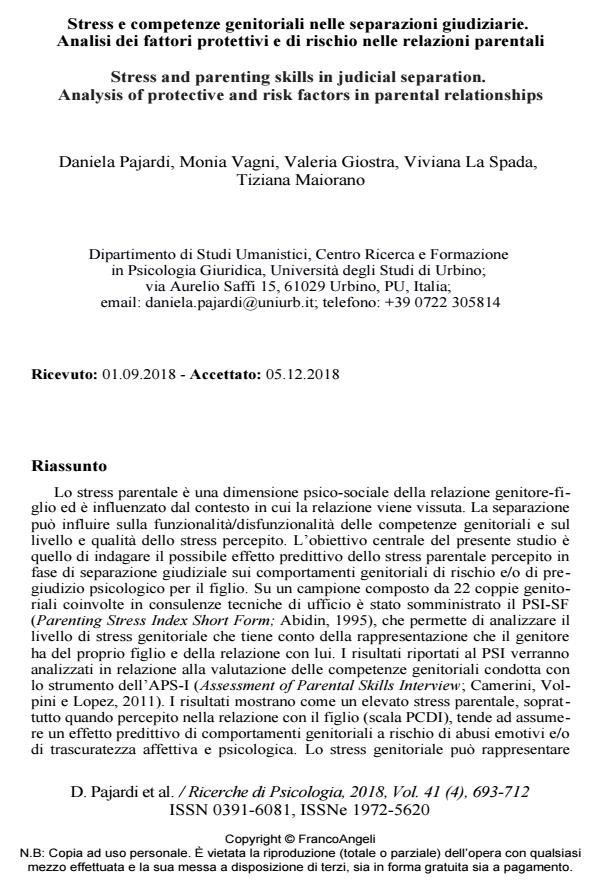Stress e competenze genitoriali nelle separazioni giudiziarie. Analisi dei fattori protettivi e di rischio nelle relazioni parentali
Titolo Rivista RICERCHE DI PSICOLOGIA
Autori/Curatori Daniela Pajardi, Monia Vagni, Valeria Giostra, Viviana La Spada, Tiziana Maiorano
Anno di pubblicazione 2019 Fascicolo 2018/4
Lingua Italiano Numero pagine 20 P. 693-712 Dimensione file 224 KB
DOI 10.3280/RIP2018-004009
Il DOI è il codice a barre della proprietà intellettuale: per saperne di più
clicca qui
Qui sotto puoi vedere in anteprima la prima pagina di questo articolo.
Se questo articolo ti interessa, lo puoi acquistare (e scaricare in formato pdf) seguendo le facili indicazioni per acquistare il download credit. Acquista Download Credits per scaricare questo Articolo in formato PDF

FrancoAngeli è membro della Publishers International Linking Association, Inc (PILA)associazione indipendente e non profit per facilitare (attraverso i servizi tecnologici implementati da CrossRef.org) l’accesso degli studiosi ai contenuti digitali nelle pubblicazioni professionali e scientifiche
Lo stress parentale è una dimensione psico-sociale della relazione genitore-figlio ed è influenzato dal contesto in cui la relazione viene vissuta. La separa-zione può influire sulla funzionalità/disfunzionalità delle competenze genitoriali e sul livello e qualità dello stress percepito. L’obiettivo centrale del presente studio è quello di indagare il possibile effetto predittivo dello stress parentale percepito in fase di separazione giudiziale sui comportamenti genitoriali di rischio e/o di pre-giudizio psicologico per il figlio. Su un campione composto da 22 coppie genito-riali coinvolte in consulenze tecniche di ufficio è stato somministrato il PSI-SF (Parenting Stress Index Short Form; Abidin, 1995), che permette di analizzare il livello di stress genitoriale che tiene conto della rappresentazione che il genitore ha del proprio figlio e della relazione con lui. I risultati riportati al PSI verranno analizzati in relazione alla valutazione delle competenze genitoriali condotta con lo strumento dell’APS-I (Assessment of Parental Skills Interview; Camerini, Vol-pini e Lopez, 2011). I risultati mostrano come un elevato stress parentale, soprat-tutto quando percepito nella relazione con il figlio (scala PCDI), tende ad assu-mere un effetto predittivo di comportamenti genitoriali a rischio di abusi emotivi e/o di trascuratezza affettiva e psicologica. Lo stress genitoriale può rappresenta-re un’interessante chiave di lettura della dinamica tra genitori e figli e delle com-petenze genitoriali, utile sia in ottica clinica che specificatamente ai fini della consulenza tecnica d’ufficio.
Parole chiave:Conflittualità genitoriale, stress genitoriale, consulenza tecnica, competenze genitoriali.
- Court-appointed expert consultation in Italy: an ethnographic study of parents’ beliefs, expectations, and experiences Antonio Iudici, Francesca Rainieri, Tania Fiorini, in Frontiers in Psychology 1668693/2025
DOI: 10.3389/fpsyg.2025.1668693 - La decisione del giudice di fronte all'alta conflittualità genitoriale: quando ricorrere alla coordinazione genitoriale Daniela Pajardi, Carlo Trionfi, Viviana La Spada, Stephanie Castoldi, Claudia Rubis, Monia Vagni, in MALTRATTAMENTO E ABUSO ALL'INFANZIA 3/2019 pp.87
DOI: 10.3280/MAL2019-003007
Daniela Pajardi, Monia Vagni, Valeria Giostra, Viviana La Spada, Tiziana Maiorano, Stress e competenze genitoriali nelle separazioni giudiziarie. Analisi dei fattori protettivi e di rischio nelle relazioni parentali in "RICERCHE DI PSICOLOGIA " 4/2018, pp 693-712, DOI: 10.3280/RIP2018-004009